Report on the Australian Royal Commission Inquiry in Finance
VerifiedAdded on 2020/03/16
|13
|3982
|39
Report
AI Summary
This report analyzes the Australian Royal Commission's inquiry into the financial services sector, examining misconduct by financial entities, including banks and superannuation funds, their directors, employees, and officers. It investigates conduct not meeting community expectations, the use of retirement savings, and the effectiveness of consumer redressal mechanisms. The report assesses the adequacy of existing legislation, industry self-regulation, and internal systems for identifying and addressing misconduct. It also evaluates the regulators' ability to identify and address misconduct and proposes necessary changes to the legal framework, financial regulators, and industry practices to prevent future misconduct. The background of the inquiry is discussed, including scandals involving major banks like CBA, NAB, and Westpac. The report highlights issues and problems with the conduct of major banks, the need for reform, and the lessons learned from the Global Financial Crisis. It also examines the government's approach to reforms, including the establishment of the Australian Financial Complaints Authority and increased powers for ASIC, and the limitations of the Royal Commission's inquiry. The report underscores the importance of a fair, efficient, and resilient financial system and the high expectations the community has of financial institutions.
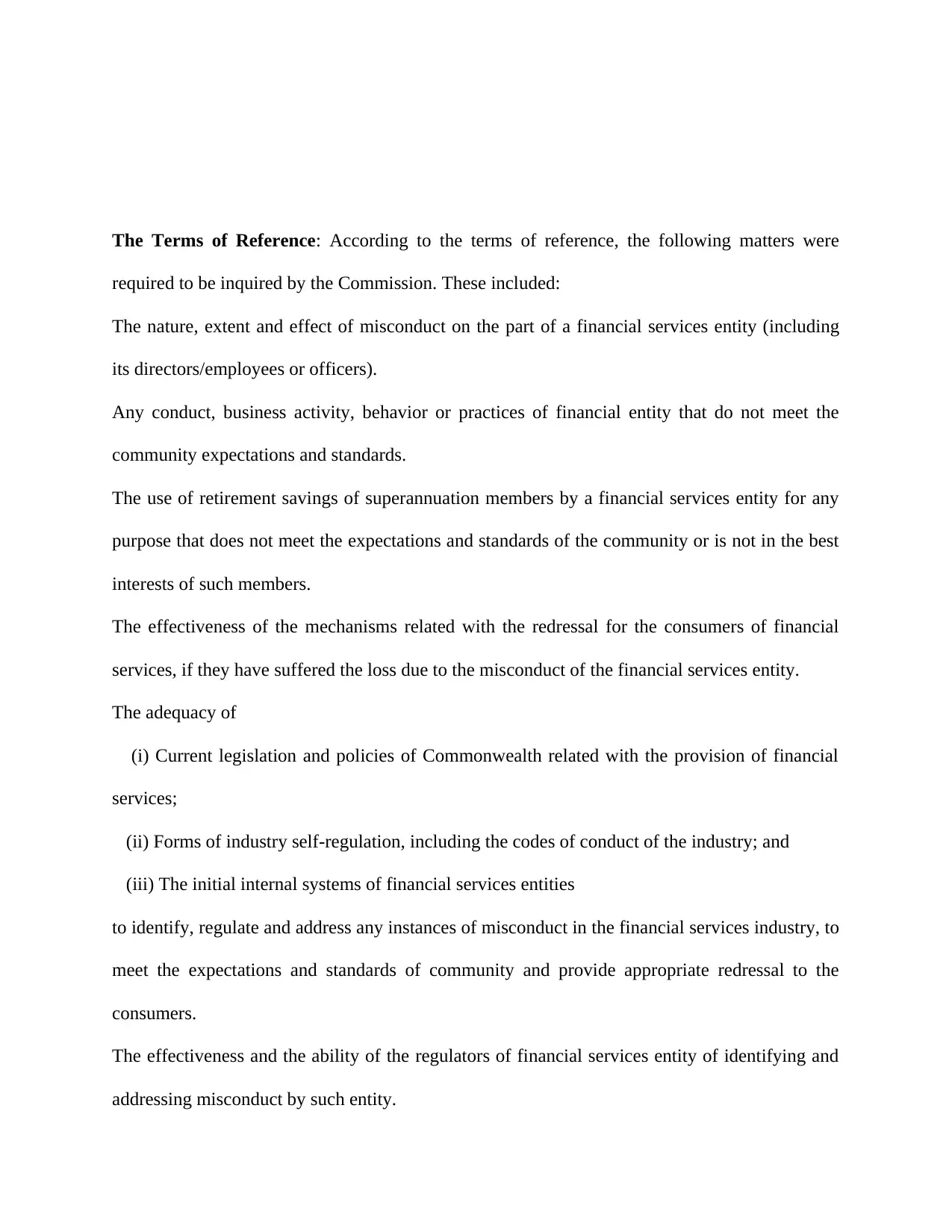
The Terms of Reference: According to the terms of reference, the following matters were
required to be inquired by the Commission. These included:
The nature, extent and effect of misconduct on the part of a financial services entity (including
its directors/employees or officers).
Any conduct, business activity, behavior or practices of financial entity that do not meet the
community expectations and standards.
The use of retirement savings of superannuation members by a financial services entity for any
purpose that does not meet the expectations and standards of the community or is not in the best
interests of such members.
The effectiveness of the mechanisms related with the redressal for the consumers of financial
services, if they have suffered the loss due to the misconduct of the financial services entity.
The adequacy of
(i) Current legislation and policies of Commonwealth related with the provision of financial
services;
(ii) Forms of industry self-regulation, including the codes of conduct of the industry; and
(iii) The initial internal systems of financial services entities
to identify, regulate and address any instances of misconduct in the financial services industry, to
meet the expectations and standards of community and provide appropriate redressal to the
consumers.
The effectiveness and the ability of the regulators of financial services entity of identifying and
addressing misconduct by such entity.
required to be inquired by the Commission. These included:
The nature, extent and effect of misconduct on the part of a financial services entity (including
its directors/employees or officers).
Any conduct, business activity, behavior or practices of financial entity that do not meet the
community expectations and standards.
The use of retirement savings of superannuation members by a financial services entity for any
purpose that does not meet the expectations and standards of the community or is not in the best
interests of such members.
The effectiveness of the mechanisms related with the redressal for the consumers of financial
services, if they have suffered the loss due to the misconduct of the financial services entity.
The adequacy of
(i) Current legislation and policies of Commonwealth related with the provision of financial
services;
(ii) Forms of industry self-regulation, including the codes of conduct of the industry; and
(iii) The initial internal systems of financial services entities
to identify, regulate and address any instances of misconduct in the financial services industry, to
meet the expectations and standards of community and provide appropriate redressal to the
consumers.
The effectiveness and the ability of the regulators of financial services entity of identifying and
addressing misconduct by such entity.
Paraphrase This Document
Need a fresh take? Get an instant paraphrase of this document with our AI Paraphraser
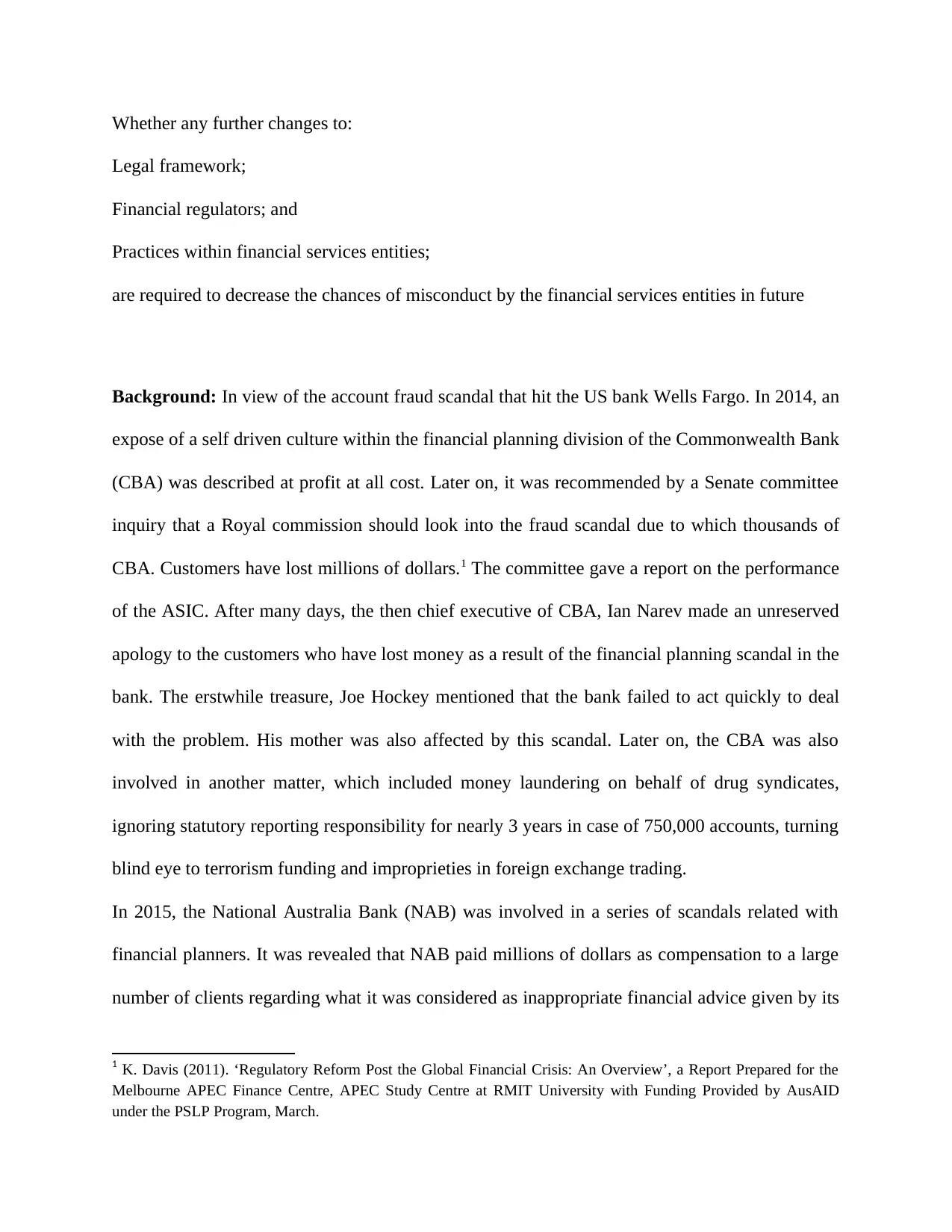
Whether any further changes to:
Legal framework;
Financial regulators; and
Practices within financial services entities;
are required to decrease the chances of misconduct by the financial services entities in future
Background: In view of the account fraud scandal that hit the US bank Wells Fargo. In 2014, an
expose of a self driven culture within the financial planning division of the Commonwealth Bank
(CBA) was described at profit at all cost. Later on, it was recommended by a Senate committee
inquiry that a Royal commission should look into the fraud scandal due to which thousands of
CBA. Customers have lost millions of dollars.1 The committee gave a report on the performance
of the ASIC. After many days, the then chief executive of CBA, Ian Narev made an unreserved
apology to the customers who have lost money as a result of the financial planning scandal in the
bank. The erstwhile treasure, Joe Hockey mentioned that the bank failed to act quickly to deal
with the problem. His mother was also affected by this scandal. Later on, the CBA was also
involved in another matter, which included money laundering on behalf of drug syndicates,
ignoring statutory reporting responsibility for nearly 3 years in case of 750,000 accounts, turning
blind eye to terrorism funding and improprieties in foreign exchange trading.
In 2015, the National Australia Bank (NAB) was involved in a series of scandals related with
financial planners. It was revealed that NAB paid millions of dollars as compensation to a large
number of clients regarding what it was considered as inappropriate financial advice given by its
1 K. Davis (2011). ‘Regulatory Reform Post the Global Financial Crisis: An Overview’, a Report Prepared for the
Melbourne APEC Finance Centre, APEC Study Centre at RMIT University with Funding Provided by AusAID
under the PSLP Program, March.
Legal framework;
Financial regulators; and
Practices within financial services entities;
are required to decrease the chances of misconduct by the financial services entities in future
Background: In view of the account fraud scandal that hit the US bank Wells Fargo. In 2014, an
expose of a self driven culture within the financial planning division of the Commonwealth Bank
(CBA) was described at profit at all cost. Later on, it was recommended by a Senate committee
inquiry that a Royal commission should look into the fraud scandal due to which thousands of
CBA. Customers have lost millions of dollars.1 The committee gave a report on the performance
of the ASIC. After many days, the then chief executive of CBA, Ian Narev made an unreserved
apology to the customers who have lost money as a result of the financial planning scandal in the
bank. The erstwhile treasure, Joe Hockey mentioned that the bank failed to act quickly to deal
with the problem. His mother was also affected by this scandal. Later on, the CBA was also
involved in another matter, which included money laundering on behalf of drug syndicates,
ignoring statutory reporting responsibility for nearly 3 years in case of 750,000 accounts, turning
blind eye to terrorism funding and improprieties in foreign exchange trading.
In 2015, the National Australia Bank (NAB) was involved in a series of scandals related with
financial planners. It was revealed that NAB paid millions of dollars as compensation to a large
number of clients regarding what it was considered as inappropriate financial advice given by its
1 K. Davis (2011). ‘Regulatory Reform Post the Global Financial Crisis: An Overview’, a Report Prepared for the
Melbourne APEC Finance Centre, APEC Study Centre at RMIT University with Funding Provided by AusAID
under the PSLP Program, March.
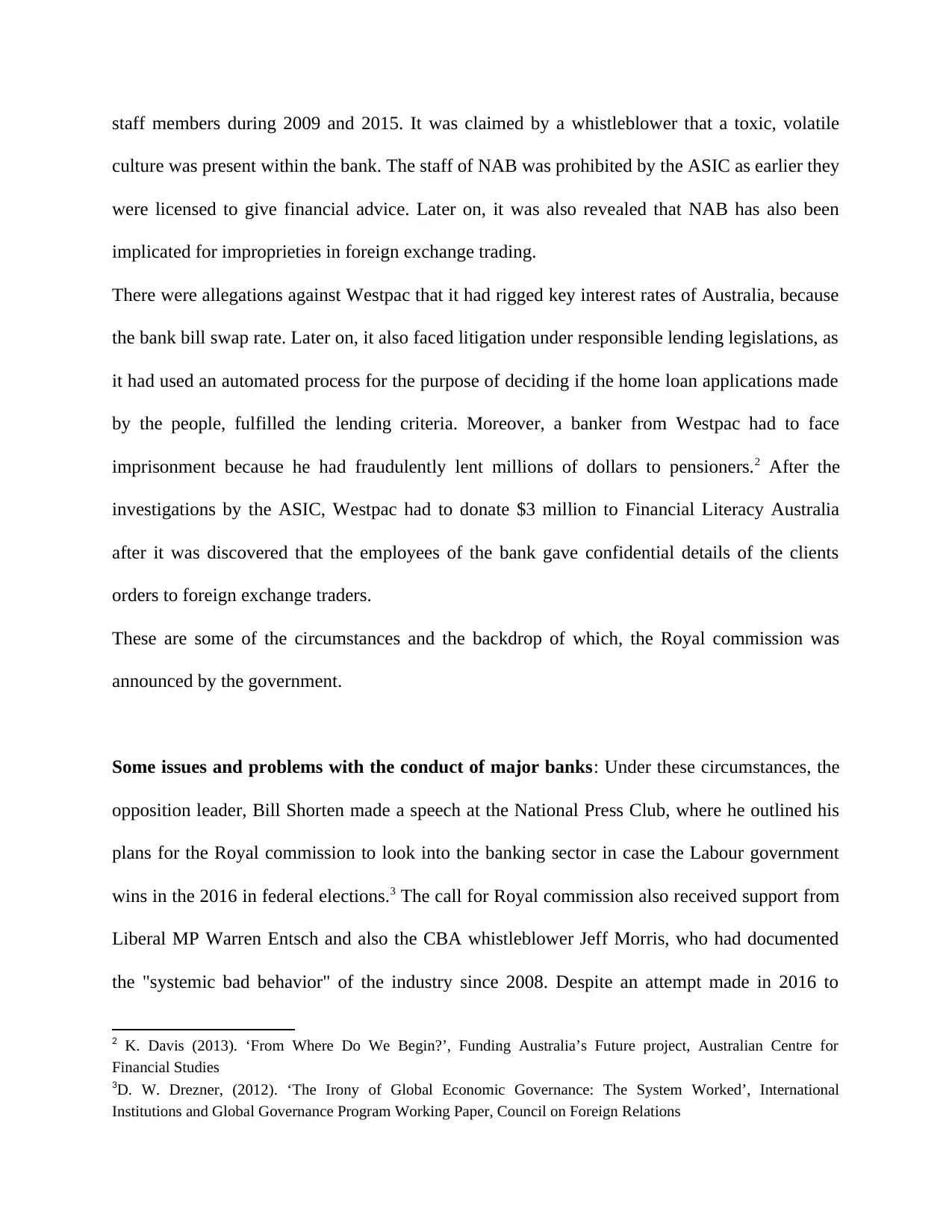
staff members during 2009 and 2015. It was claimed by a whistleblower that a toxic, volatile
culture was present within the bank. The staff of NAB was prohibited by the ASIC as earlier they
were licensed to give financial advice. Later on, it was also revealed that NAB has also been
implicated for improprieties in foreign exchange trading.
There were allegations against Westpac that it had rigged key interest rates of Australia, because
the bank bill swap rate. Later on, it also faced litigation under responsible lending legislations, as
it had used an automated process for the purpose of deciding if the home loan applications made
by the people, fulfilled the lending criteria. Moreover, a banker from Westpac had to face
imprisonment because he had fraudulently lent millions of dollars to pensioners.2 After the
investigations by the ASIC, Westpac had to donate $3 million to Financial Literacy Australia
after it was discovered that the employees of the bank gave confidential details of the clients
orders to foreign exchange traders.
These are some of the circumstances and the backdrop of which, the Royal commission was
announced by the government.
Some issues and problems with the conduct of major banks: Under these circumstances, the
opposition leader, Bill Shorten made a speech at the National Press Club, where he outlined his
plans for the Royal commission to look into the banking sector in case the Labour government
wins in the 2016 in federal elections.3 The call for Royal commission also received support from
Liberal MP Warren Entsch and also the CBA whistleblower Jeff Morris, who had documented
the "systemic bad behavior" of the industry since 2008. Despite an attempt made in 2016 to
2 K. Davis (2013). ‘From Where Do We Begin?’, Funding Australia’s Future project, Australian Centre for
Financial Studies
3D. W. Drezner, (2012). ‘The Irony of Global Economic Governance: The System Worked’, International
Institutions and Global Governance Program Working Paper, Council on Foreign Relations
culture was present within the bank. The staff of NAB was prohibited by the ASIC as earlier they
were licensed to give financial advice. Later on, it was also revealed that NAB has also been
implicated for improprieties in foreign exchange trading.
There were allegations against Westpac that it had rigged key interest rates of Australia, because
the bank bill swap rate. Later on, it also faced litigation under responsible lending legislations, as
it had used an automated process for the purpose of deciding if the home loan applications made
by the people, fulfilled the lending criteria. Moreover, a banker from Westpac had to face
imprisonment because he had fraudulently lent millions of dollars to pensioners.2 After the
investigations by the ASIC, Westpac had to donate $3 million to Financial Literacy Australia
after it was discovered that the employees of the bank gave confidential details of the clients
orders to foreign exchange traders.
These are some of the circumstances and the backdrop of which, the Royal commission was
announced by the government.
Some issues and problems with the conduct of major banks: Under these circumstances, the
opposition leader, Bill Shorten made a speech at the National Press Club, where he outlined his
plans for the Royal commission to look into the banking sector in case the Labour government
wins in the 2016 in federal elections.3 The call for Royal commission also received support from
Liberal MP Warren Entsch and also the CBA whistleblower Jeff Morris, who had documented
the "systemic bad behavior" of the industry since 2008. Despite an attempt made in 2016 to
2 K. Davis (2013). ‘From Where Do We Begin?’, Funding Australia’s Future project, Australian Centre for
Financial Studies
3D. W. Drezner, (2012). ‘The Irony of Global Economic Governance: The System Worked’, International
Institutions and Global Governance Program Working Paper, Council on Foreign Relations
⊘ This is a preview!⊘
Do you want full access?
Subscribe today to unlock all pages.

Trusted by 1+ million students worldwide
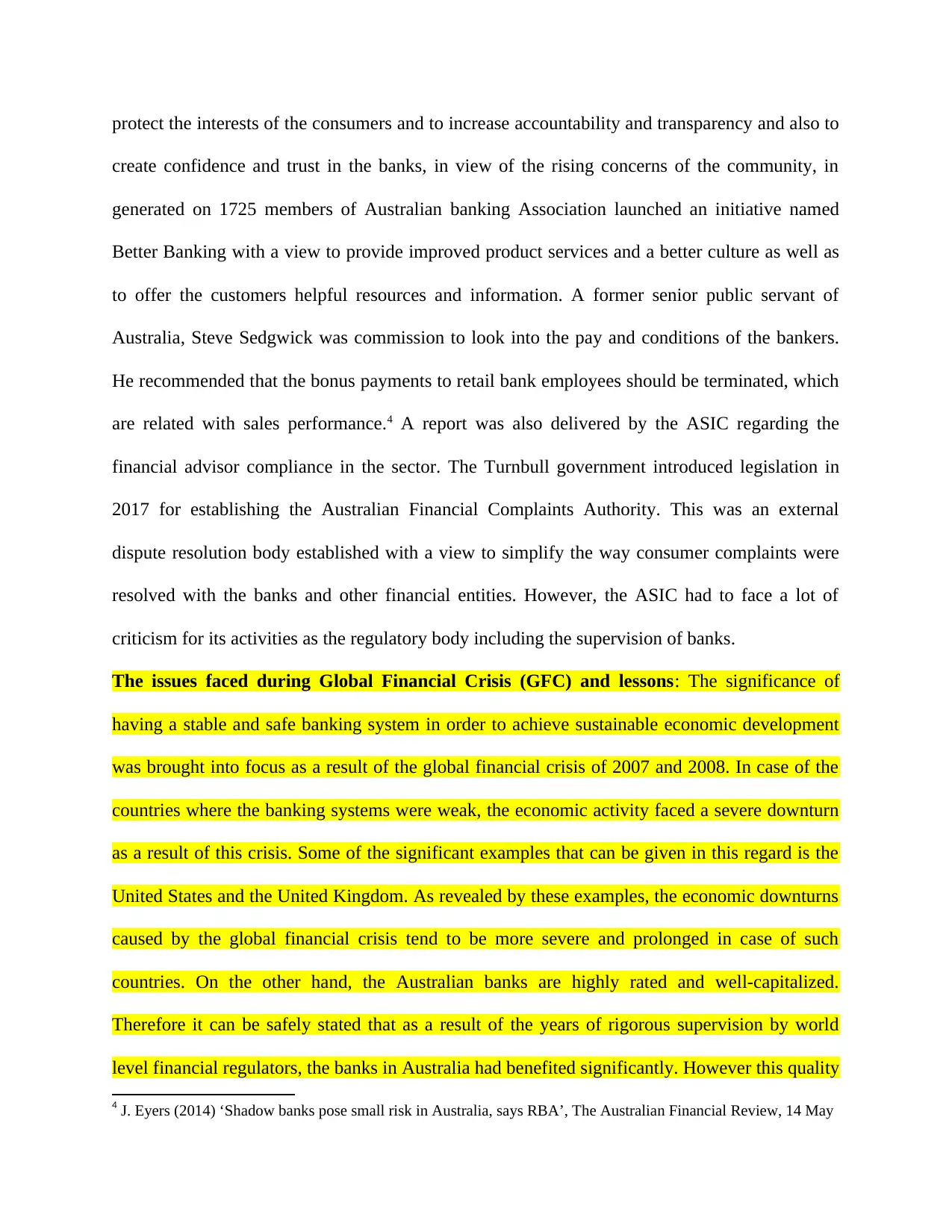
protect the interests of the consumers and to increase accountability and transparency and also to
create confidence and trust in the banks, in view of the rising concerns of the community, in
generated on 1725 members of Australian banking Association launched an initiative named
Better Banking with a view to provide improved product services and a better culture as well as
to offer the customers helpful resources and information. A former senior public servant of
Australia, Steve Sedgwick was commission to look into the pay and conditions of the bankers.
He recommended that the bonus payments to retail bank employees should be terminated, which
are related with sales performance.4 A report was also delivered by the ASIC regarding the
financial advisor compliance in the sector. The Turnbull government introduced legislation in
2017 for establishing the Australian Financial Complaints Authority. This was an external
dispute resolution body established with a view to simplify the way consumer complaints were
resolved with the banks and other financial entities. However, the ASIC had to face a lot of
criticism for its activities as the regulatory body including the supervision of banks.
The issues faced during Global Financial Crisis (GFC) and lessons: The significance of
having a stable and safe banking system in order to achieve sustainable economic development
was brought into focus as a result of the global financial crisis of 2007 and 2008. In case of the
countries where the banking systems were weak, the economic activity faced a severe downturn
as a result of this crisis. Some of the significant examples that can be given in this regard is the
United States and the United Kingdom. As revealed by these examples, the economic downturns
caused by the global financial crisis tend to be more severe and prolonged in case of such
countries. On the other hand, the Australian banks are highly rated and well-capitalized.
Therefore it can be safely stated that as a result of the years of rigorous supervision by world
level financial regulators, the banks in Australia had benefited significantly. However this quality
4 J. Eyers (2014) ‘Shadow banks pose small risk in Australia, says RBA’, The Australian Financial Review, 14 May
create confidence and trust in the banks, in view of the rising concerns of the community, in
generated on 1725 members of Australian banking Association launched an initiative named
Better Banking with a view to provide improved product services and a better culture as well as
to offer the customers helpful resources and information. A former senior public servant of
Australia, Steve Sedgwick was commission to look into the pay and conditions of the bankers.
He recommended that the bonus payments to retail bank employees should be terminated, which
are related with sales performance.4 A report was also delivered by the ASIC regarding the
financial advisor compliance in the sector. The Turnbull government introduced legislation in
2017 for establishing the Australian Financial Complaints Authority. This was an external
dispute resolution body established with a view to simplify the way consumer complaints were
resolved with the banks and other financial entities. However, the ASIC had to face a lot of
criticism for its activities as the regulatory body including the supervision of banks.
The issues faced during Global Financial Crisis (GFC) and lessons: The significance of
having a stable and safe banking system in order to achieve sustainable economic development
was brought into focus as a result of the global financial crisis of 2007 and 2008. In case of the
countries where the banking systems were weak, the economic activity faced a severe downturn
as a result of this crisis. Some of the significant examples that can be given in this regard is the
United States and the United Kingdom. As revealed by these examples, the economic downturns
caused by the global financial crisis tend to be more severe and prolonged in case of such
countries. On the other hand, the Australian banks are highly rated and well-capitalized.
Therefore it can be safely stated that as a result of the years of rigorous supervision by world
level financial regulators, the banks in Australia had benefited significantly. However this quality
4 J. Eyers (2014) ‘Shadow banks pose small risk in Australia, says RBA’, The Australian Financial Review, 14 May
Paraphrase This Document
Need a fresh take? Get an instant paraphrase of this document with our AI Paraphraser
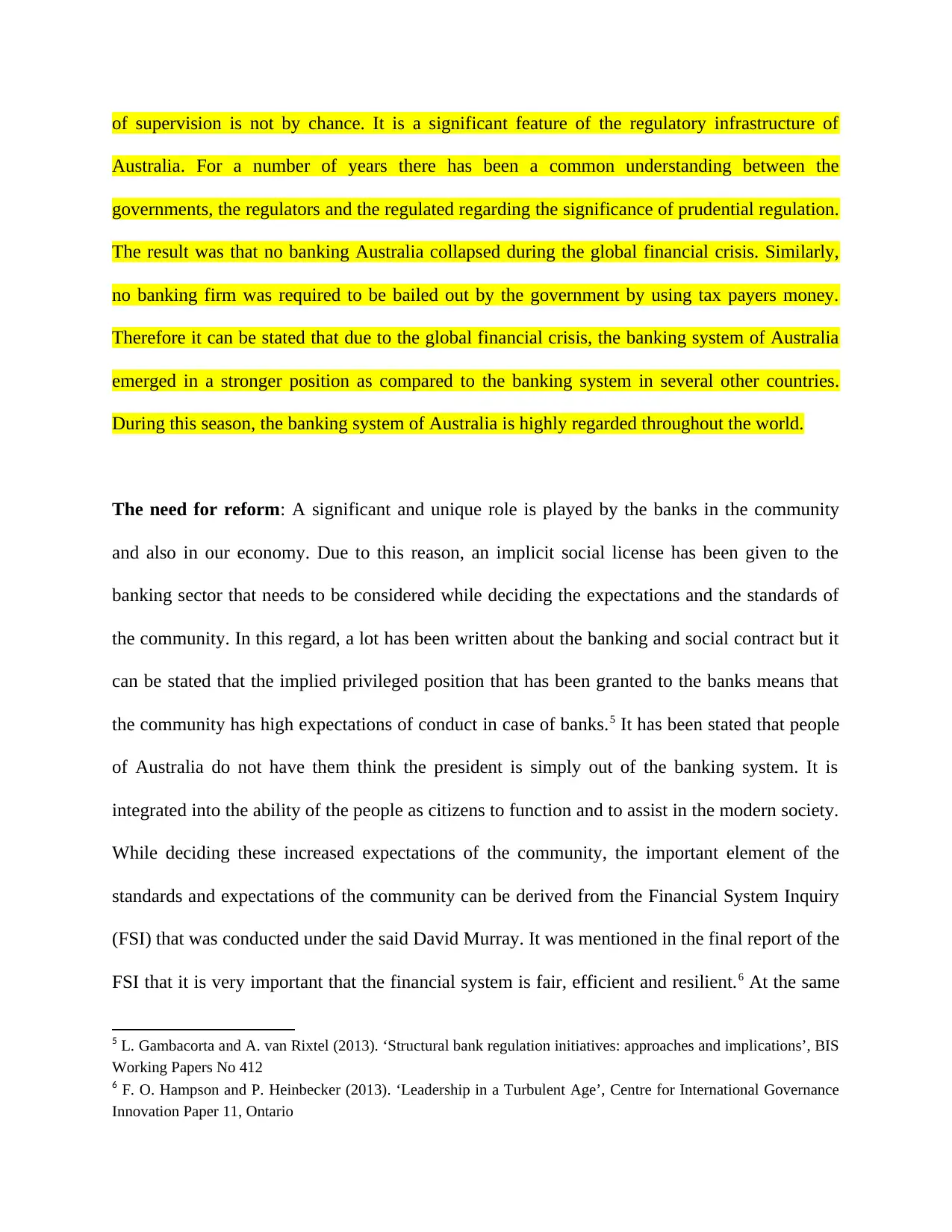
of supervision is not by chance. It is a significant feature of the regulatory infrastructure of
Australia. For a number of years there has been a common understanding between the
governments, the regulators and the regulated regarding the significance of prudential regulation.
The result was that no banking Australia collapsed during the global financial crisis. Similarly,
no banking firm was required to be bailed out by the government by using tax payers money.
Therefore it can be stated that due to the global financial crisis, the banking system of Australia
emerged in a stronger position as compared to the banking system in several other countries.
During this season, the banking system of Australia is highly regarded throughout the world.
The need for reform: A significant and unique role is played by the banks in the community
and also in our economy. Due to this reason, an implicit social license has been given to the
banking sector that needs to be considered while deciding the expectations and the standards of
the community. In this regard, a lot has been written about the banking and social contract but it
can be stated that the implied privileged position that has been granted to the banks means that
the community has high expectations of conduct in case of banks.5 It has been stated that people
of Australia do not have them think the president is simply out of the banking system. It is
integrated into the ability of the people as citizens to function and to assist in the modern society.
While deciding these increased expectations of the community, the important element of the
standards and expectations of the community can be derived from the Financial System Inquiry
(FSI) that was conducted under the said David Murray. It was mentioned in the final report of the
FSI that it is very important that the financial system is fair, efficient and resilient.6 At the same
5 L. Gambacorta and A. van Rixtel (2013). ‘Structural bank regulation initiatives: approaches and implications’, BIS
Working Papers No 412
6 F. O. Hampson and P. Heinbecker (2013). ‘Leadership in a Turbulent Age’, Centre for International Governance
Innovation Paper 11, Ontario
Australia. For a number of years there has been a common understanding between the
governments, the regulators and the regulated regarding the significance of prudential regulation.
The result was that no banking Australia collapsed during the global financial crisis. Similarly,
no banking firm was required to be bailed out by the government by using tax payers money.
Therefore it can be stated that due to the global financial crisis, the banking system of Australia
emerged in a stronger position as compared to the banking system in several other countries.
During this season, the banking system of Australia is highly regarded throughout the world.
The need for reform: A significant and unique role is played by the banks in the community
and also in our economy. Due to this reason, an implicit social license has been given to the
banking sector that needs to be considered while deciding the expectations and the standards of
the community. In this regard, a lot has been written about the banking and social contract but it
can be stated that the implied privileged position that has been granted to the banks means that
the community has high expectations of conduct in case of banks.5 It has been stated that people
of Australia do not have them think the president is simply out of the banking system. It is
integrated into the ability of the people as citizens to function and to assist in the modern society.
While deciding these increased expectations of the community, the important element of the
standards and expectations of the community can be derived from the Financial System Inquiry
(FSI) that was conducted under the said David Murray. It was mentioned in the final report of the
FSI that it is very important that the financial system is fair, efficient and resilient.6 At the same
5 L. Gambacorta and A. van Rixtel (2013). ‘Structural bank regulation initiatives: approaches and implications’, BIS
Working Papers No 412
6 F. O. Hampson and P. Heinbecker (2013). ‘Leadership in a Turbulent Age’, Centre for International Governance
Innovation Paper 11, Ontario
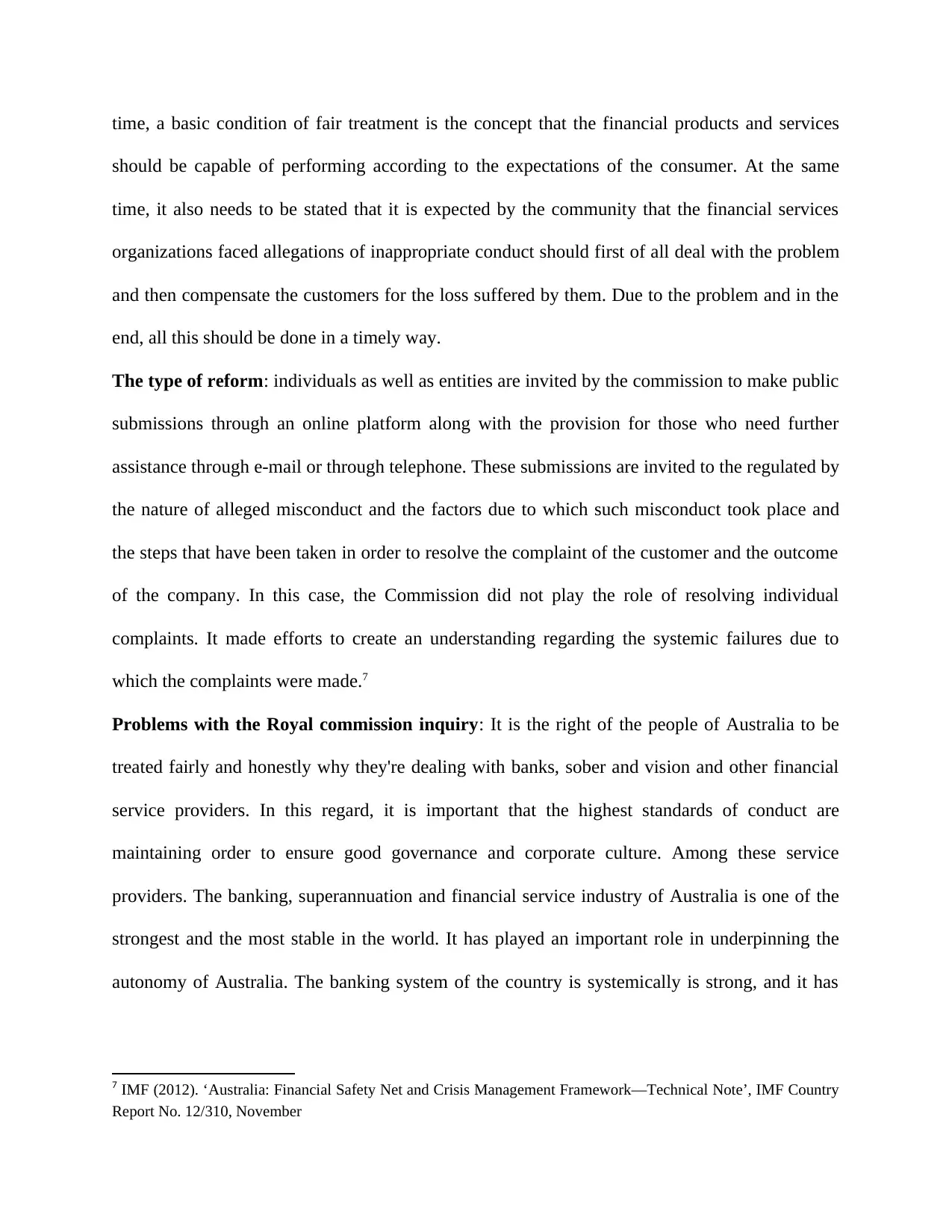
time, a basic condition of fair treatment is the concept that the financial products and services
should be capable of performing according to the expectations of the consumer. At the same
time, it also needs to be stated that it is expected by the community that the financial services
organizations faced allegations of inappropriate conduct should first of all deal with the problem
and then compensate the customers for the loss suffered by them. Due to the problem and in the
end, all this should be done in a timely way.
The type of reform: individuals as well as entities are invited by the commission to make public
submissions through an online platform along with the provision for those who need further
assistance through e-mail or through telephone. These submissions are invited to the regulated by
the nature of alleged misconduct and the factors due to which such misconduct took place and
the steps that have been taken in order to resolve the complaint of the customer and the outcome
of the company. In this case, the Commission did not play the role of resolving individual
complaints. It made efforts to create an understanding regarding the systemic failures due to
which the complaints were made.7
Problems with the Royal commission inquiry: It is the right of the people of Australia to be
treated fairly and honestly why they're dealing with banks, sober and vision and other financial
service providers. In this regard, it is important that the highest standards of conduct are
maintaining order to ensure good governance and corporate culture. Among these service
providers. The banking, superannuation and financial service industry of Australia is one of the
strongest and the most stable in the world. It has played an important role in underpinning the
autonomy of Australia. The banking system of the country is systemically is strong, and it has
7 IMF (2012). ‘Australia: Financial Safety Net and Crisis Management Framework—Technical Note’, IMF Country
Report No. 12/310, November
should be capable of performing according to the expectations of the consumer. At the same
time, it also needs to be stated that it is expected by the community that the financial services
organizations faced allegations of inappropriate conduct should first of all deal with the problem
and then compensate the customers for the loss suffered by them. Due to the problem and in the
end, all this should be done in a timely way.
The type of reform: individuals as well as entities are invited by the commission to make public
submissions through an online platform along with the provision for those who need further
assistance through e-mail or through telephone. These submissions are invited to the regulated by
the nature of alleged misconduct and the factors due to which such misconduct took place and
the steps that have been taken in order to resolve the complaint of the customer and the outcome
of the company. In this case, the Commission did not play the role of resolving individual
complaints. It made efforts to create an understanding regarding the systemic failures due to
which the complaints were made.7
Problems with the Royal commission inquiry: It is the right of the people of Australia to be
treated fairly and honestly why they're dealing with banks, sober and vision and other financial
service providers. In this regard, it is important that the highest standards of conduct are
maintaining order to ensure good governance and corporate culture. Among these service
providers. The banking, superannuation and financial service industry of Australia is one of the
strongest and the most stable in the world. It has played an important role in underpinning the
autonomy of Australia. The banking system of the country is systemically is strong, and it has
7 IMF (2012). ‘Australia: Financial Safety Net and Crisis Management Framework—Technical Note’, IMF Country
Report No. 12/310, November
⊘ This is a preview!⊘
Do you want full access?
Subscribe today to unlock all pages.

Trusted by 1+ million students worldwide
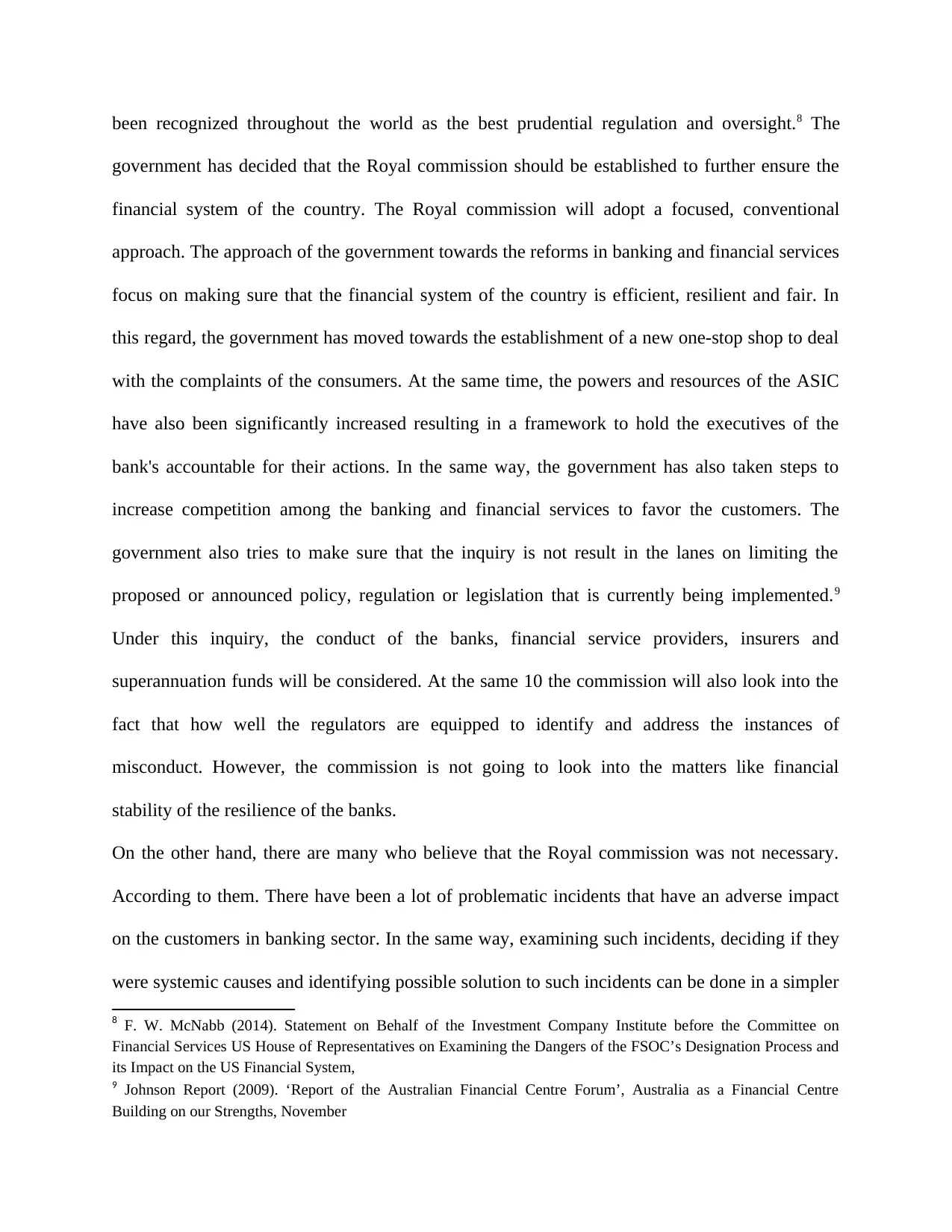
been recognized throughout the world as the best prudential regulation and oversight.8 The
government has decided that the Royal commission should be established to further ensure the
financial system of the country. The Royal commission will adopt a focused, conventional
approach. The approach of the government towards the reforms in banking and financial services
focus on making sure that the financial system of the country is efficient, resilient and fair. In
this regard, the government has moved towards the establishment of a new one-stop shop to deal
with the complaints of the consumers. At the same time, the powers and resources of the ASIC
have also been significantly increased resulting in a framework to hold the executives of the
bank's accountable for their actions. In the same way, the government has also taken steps to
increase competition among the banking and financial services to favor the customers. The
government also tries to make sure that the inquiry is not result in the lanes on limiting the
proposed or announced policy, regulation or legislation that is currently being implemented.9
Under this inquiry, the conduct of the banks, financial service providers, insurers and
superannuation funds will be considered. At the same 10 the commission will also look into the
fact that how well the regulators are equipped to identify and address the instances of
misconduct. However, the commission is not going to look into the matters like financial
stability of the resilience of the banks.
On the other hand, there are many who believe that the Royal commission was not necessary.
According to them. There have been a lot of problematic incidents that have an adverse impact
on the customers in banking sector. In the same way, examining such incidents, deciding if they
were systemic causes and identifying possible solution to such incidents can be done in a simpler
8 F. W. McNabb (2014). Statement on Behalf of the Investment Company Institute before the Committee on
Financial Services US House of Representatives on Examining the Dangers of the FSOC’s Designation Process and
its Impact on the US Financial System,
9 Johnson Report (2009). ‘Report of the Australian Financial Centre Forum’, Australia as a Financial Centre
Building on our Strengths, November
government has decided that the Royal commission should be established to further ensure the
financial system of the country. The Royal commission will adopt a focused, conventional
approach. The approach of the government towards the reforms in banking and financial services
focus on making sure that the financial system of the country is efficient, resilient and fair. In
this regard, the government has moved towards the establishment of a new one-stop shop to deal
with the complaints of the consumers. At the same time, the powers and resources of the ASIC
have also been significantly increased resulting in a framework to hold the executives of the
bank's accountable for their actions. In the same way, the government has also taken steps to
increase competition among the banking and financial services to favor the customers. The
government also tries to make sure that the inquiry is not result in the lanes on limiting the
proposed or announced policy, regulation or legislation that is currently being implemented.9
Under this inquiry, the conduct of the banks, financial service providers, insurers and
superannuation funds will be considered. At the same 10 the commission will also look into the
fact that how well the regulators are equipped to identify and address the instances of
misconduct. However, the commission is not going to look into the matters like financial
stability of the resilience of the banks.
On the other hand, there are many who believe that the Royal commission was not necessary.
According to them. There have been a lot of problematic incidents that have an adverse impact
on the customers in banking sector. In the same way, examining such incidents, deciding if they
were systemic causes and identifying possible solution to such incidents can be done in a simpler
8 F. W. McNabb (2014). Statement on Behalf of the Investment Company Institute before the Committee on
Financial Services US House of Representatives on Examining the Dangers of the FSOC’s Designation Process and
its Impact on the US Financial System,
9 Johnson Report (2009). ‘Report of the Australian Financial Centre Forum’, Australia as a Financial Centre
Building on our Strengths, November
Paraphrase This Document
Need a fresh take? Get an instant paraphrase of this document with our AI Paraphraser
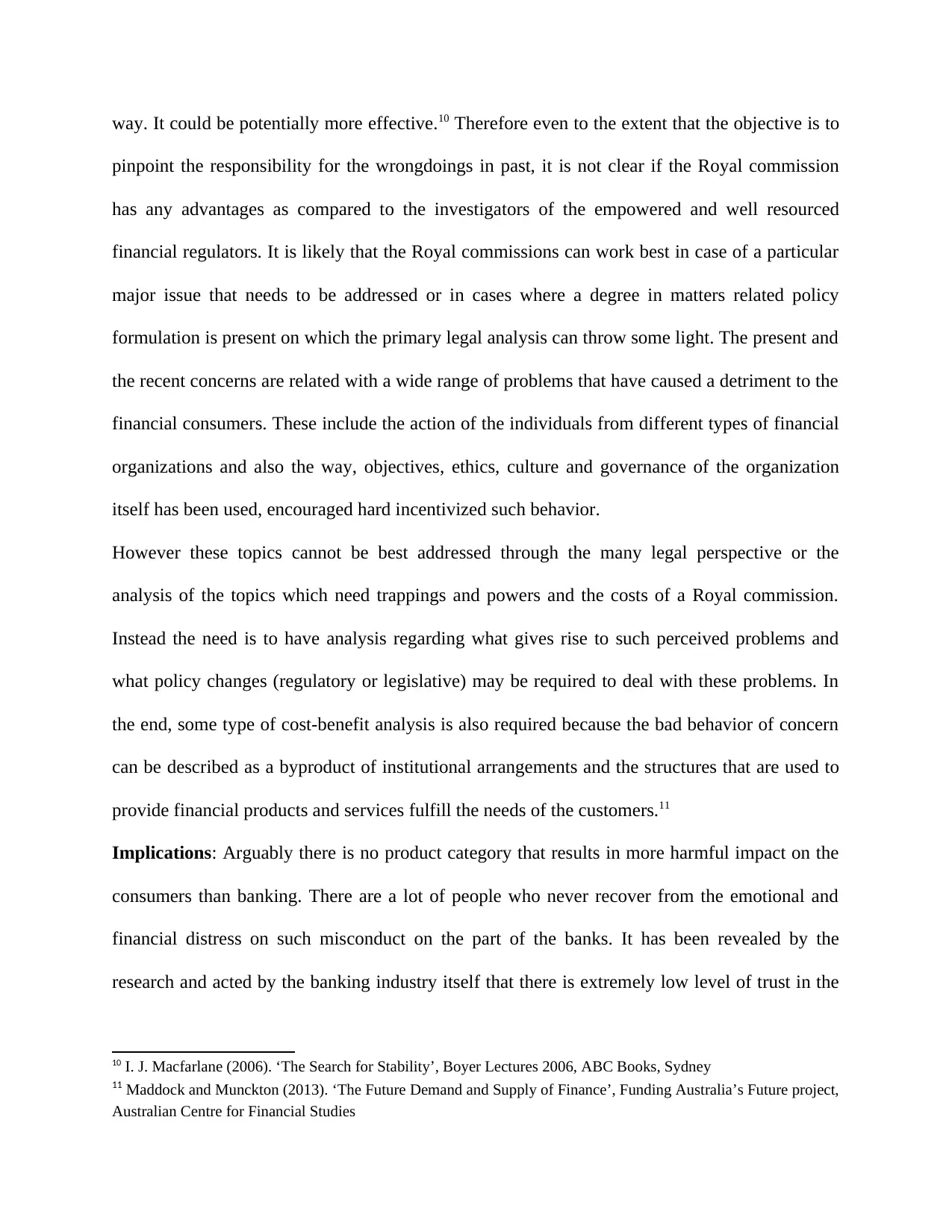
way. It could be potentially more effective.10 Therefore even to the extent that the objective is to
pinpoint the responsibility for the wrongdoings in past, it is not clear if the Royal commission
has any advantages as compared to the investigators of the empowered and well resourced
financial regulators. It is likely that the Royal commissions can work best in case of a particular
major issue that needs to be addressed or in cases where a degree in matters related policy
formulation is present on which the primary legal analysis can throw some light. The present and
the recent concerns are related with a wide range of problems that have caused a detriment to the
financial consumers. These include the action of the individuals from different types of financial
organizations and also the way, objectives, ethics, culture and governance of the organization
itself has been used, encouraged hard incentivized such behavior.
However these topics cannot be best addressed through the many legal perspective or the
analysis of the topics which need trappings and powers and the costs of a Royal commission.
Instead the need is to have analysis regarding what gives rise to such perceived problems and
what policy changes (regulatory or legislative) may be required to deal with these problems. In
the end, some type of cost-benefit analysis is also required because the bad behavior of concern
can be described as a byproduct of institutional arrangements and the structures that are used to
provide financial products and services fulfill the needs of the customers.11
Implications: Arguably there is no product category that results in more harmful impact on the
consumers than banking. There are a lot of people who never recover from the emotional and
financial distress on such misconduct on the part of the banks. It has been revealed by the
research and acted by the banking industry itself that there is extremely low level of trust in the
10 I. J. Macfarlane (2006). ‘The Search for Stability’, Boyer Lectures 2006, ABC Books, Sydney
11 Maddock and Munckton (2013). ‘The Future Demand and Supply of Finance’, Funding Australia’s Future project,
Australian Centre for Financial Studies
pinpoint the responsibility for the wrongdoings in past, it is not clear if the Royal commission
has any advantages as compared to the investigators of the empowered and well resourced
financial regulators. It is likely that the Royal commissions can work best in case of a particular
major issue that needs to be addressed or in cases where a degree in matters related policy
formulation is present on which the primary legal analysis can throw some light. The present and
the recent concerns are related with a wide range of problems that have caused a detriment to the
financial consumers. These include the action of the individuals from different types of financial
organizations and also the way, objectives, ethics, culture and governance of the organization
itself has been used, encouraged hard incentivized such behavior.
However these topics cannot be best addressed through the many legal perspective or the
analysis of the topics which need trappings and powers and the costs of a Royal commission.
Instead the need is to have analysis regarding what gives rise to such perceived problems and
what policy changes (regulatory or legislative) may be required to deal with these problems. In
the end, some type of cost-benefit analysis is also required because the bad behavior of concern
can be described as a byproduct of institutional arrangements and the structures that are used to
provide financial products and services fulfill the needs of the customers.11
Implications: Arguably there is no product category that results in more harmful impact on the
consumers than banking. There are a lot of people who never recover from the emotional and
financial distress on such misconduct on the part of the banks. It has been revealed by the
research and acted by the banking industry itself that there is extremely low level of trust in the
10 I. J. Macfarlane (2006). ‘The Search for Stability’, Boyer Lectures 2006, ABC Books, Sydney
11 Maddock and Munckton (2013). ‘The Future Demand and Supply of Finance’, Funding Australia’s Future project,
Australian Centre for Financial Studies
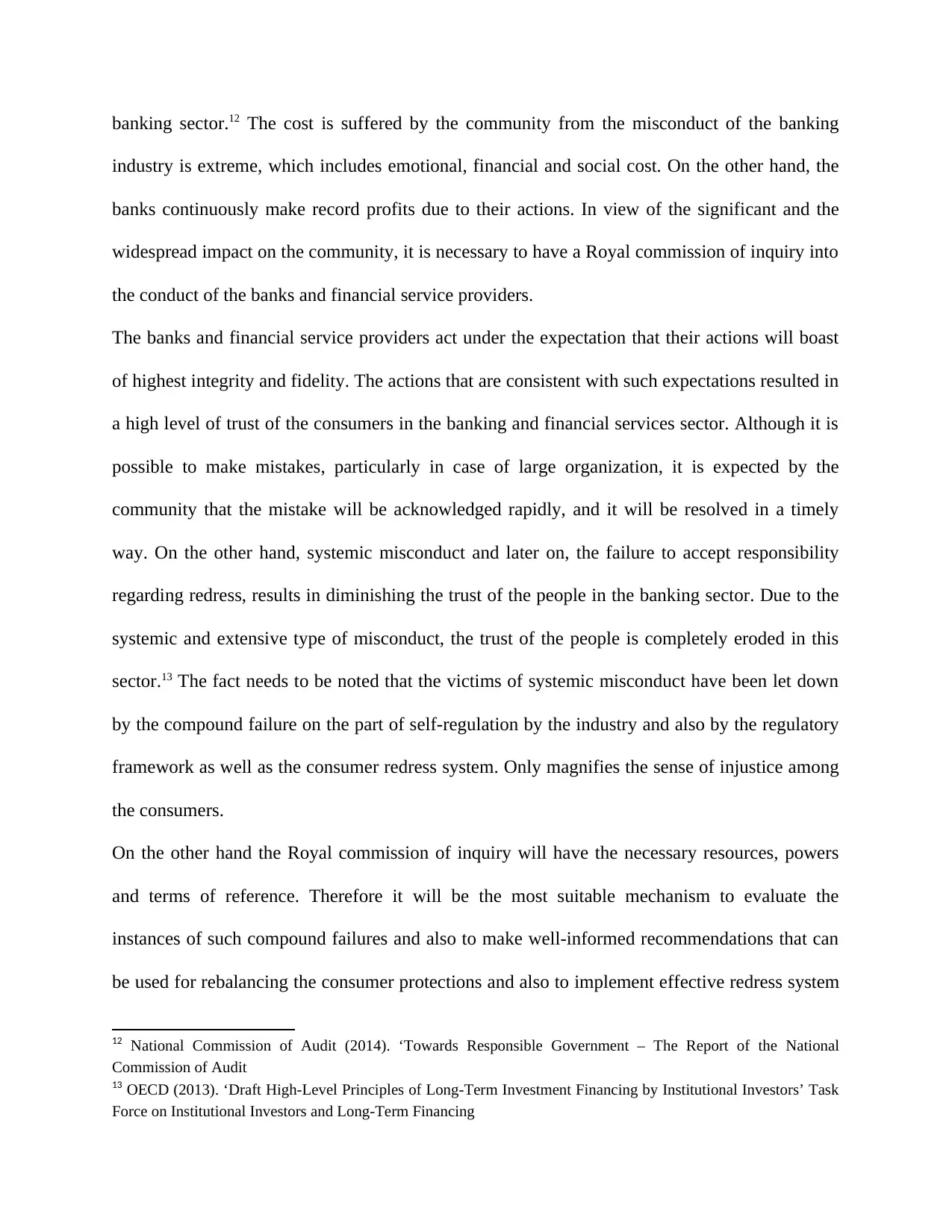
banking sector.12 The cost is suffered by the community from the misconduct of the banking
industry is extreme, which includes emotional, financial and social cost. On the other hand, the
banks continuously make record profits due to their actions. In view of the significant and the
widespread impact on the community, it is necessary to have a Royal commission of inquiry into
the conduct of the banks and financial service providers.
The banks and financial service providers act under the expectation that their actions will boast
of highest integrity and fidelity. The actions that are consistent with such expectations resulted in
a high level of trust of the consumers in the banking and financial services sector. Although it is
possible to make mistakes, particularly in case of large organization, it is expected by the
community that the mistake will be acknowledged rapidly, and it will be resolved in a timely
way. On the other hand, systemic misconduct and later on, the failure to accept responsibility
regarding redress, results in diminishing the trust of the people in the banking sector. Due to the
systemic and extensive type of misconduct, the trust of the people is completely eroded in this
sector.13 The fact needs to be noted that the victims of systemic misconduct have been let down
by the compound failure on the part of self-regulation by the industry and also by the regulatory
framework as well as the consumer redress system. Only magnifies the sense of injustice among
the consumers.
On the other hand the Royal commission of inquiry will have the necessary resources, powers
and terms of reference. Therefore it will be the most suitable mechanism to evaluate the
instances of such compound failures and also to make well-informed recommendations that can
be used for rebalancing the consumer protections and also to implement effective redress system
12 National Commission of Audit (2014). ‘Towards Responsible Government – The Report of the National
Commission of Audit
13 OECD (2013). ‘Draft High-Level Principles of Long-Term Investment Financing by Institutional Investors’ Task
Force on Institutional Investors and Long-Term Financing
industry is extreme, which includes emotional, financial and social cost. On the other hand, the
banks continuously make record profits due to their actions. In view of the significant and the
widespread impact on the community, it is necessary to have a Royal commission of inquiry into
the conduct of the banks and financial service providers.
The banks and financial service providers act under the expectation that their actions will boast
of highest integrity and fidelity. The actions that are consistent with such expectations resulted in
a high level of trust of the consumers in the banking and financial services sector. Although it is
possible to make mistakes, particularly in case of large organization, it is expected by the
community that the mistake will be acknowledged rapidly, and it will be resolved in a timely
way. On the other hand, systemic misconduct and later on, the failure to accept responsibility
regarding redress, results in diminishing the trust of the people in the banking sector. Due to the
systemic and extensive type of misconduct, the trust of the people is completely eroded in this
sector.13 The fact needs to be noted that the victims of systemic misconduct have been let down
by the compound failure on the part of self-regulation by the industry and also by the regulatory
framework as well as the consumer redress system. Only magnifies the sense of injustice among
the consumers.
On the other hand the Royal commission of inquiry will have the necessary resources, powers
and terms of reference. Therefore it will be the most suitable mechanism to evaluate the
instances of such compound failures and also to make well-informed recommendations that can
be used for rebalancing the consumer protections and also to implement effective redress system
12 National Commission of Audit (2014). ‘Towards Responsible Government – The Report of the National
Commission of Audit
13 OECD (2013). ‘Draft High-Level Principles of Long-Term Investment Financing by Institutional Investors’ Task
Force on Institutional Investors and Long-Term Financing
⊘ This is a preview!⊘
Do you want full access?
Subscribe today to unlock all pages.

Trusted by 1+ million students worldwide
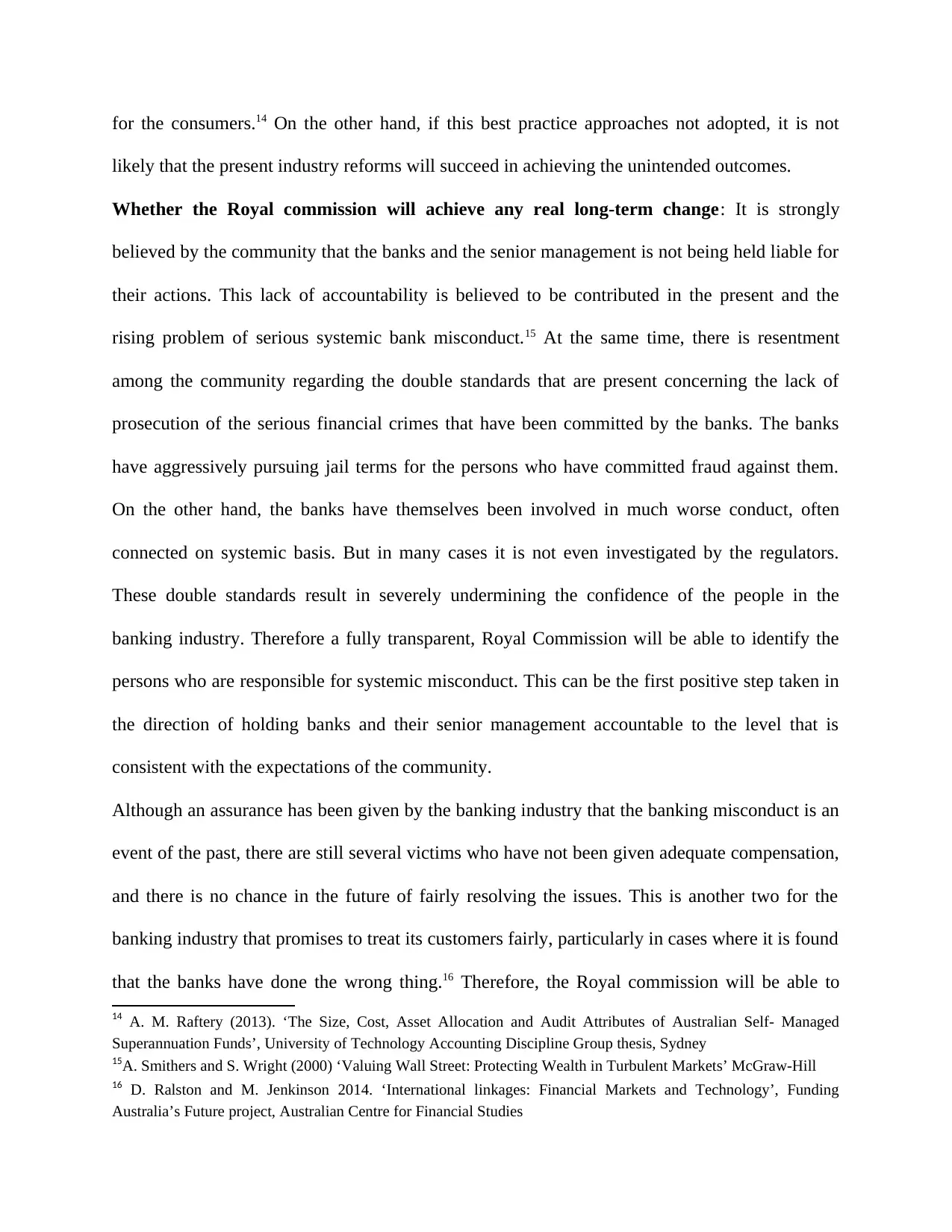
for the consumers.14 On the other hand, if this best practice approaches not adopted, it is not
likely that the present industry reforms will succeed in achieving the unintended outcomes.
Whether the Royal commission will achieve any real long-term change: It is strongly
believed by the community that the banks and the senior management is not being held liable for
their actions. This lack of accountability is believed to be contributed in the present and the
rising problem of serious systemic bank misconduct.15 At the same time, there is resentment
among the community regarding the double standards that are present concerning the lack of
prosecution of the serious financial crimes that have been committed by the banks. The banks
have aggressively pursuing jail terms for the persons who have committed fraud against them.
On the other hand, the banks have themselves been involved in much worse conduct, often
connected on systemic basis. But in many cases it is not even investigated by the regulators.
These double standards result in severely undermining the confidence of the people in the
banking industry. Therefore a fully transparent, Royal Commission will be able to identify the
persons who are responsible for systemic misconduct. This can be the first positive step taken in
the direction of holding banks and their senior management accountable to the level that is
consistent with the expectations of the community.
Although an assurance has been given by the banking industry that the banking misconduct is an
event of the past, there are still several victims who have not been given adequate compensation,
and there is no chance in the future of fairly resolving the issues. This is another two for the
banking industry that promises to treat its customers fairly, particularly in cases where it is found
that the banks have done the wrong thing.16 Therefore, the Royal commission will be able to
14 A. M. Raftery (2013). ‘The Size, Cost, Asset Allocation and Audit Attributes of Australian Self- Managed
Superannuation Funds’, University of Technology Accounting Discipline Group thesis, Sydney
15A. Smithers and S. Wright (2000) ‘Valuing Wall Street: Protecting Wealth in Turbulent Markets’ McGraw-Hill
16 D. Ralston and M. Jenkinson 2014. ‘International linkages: Financial Markets and Technology’, Funding
Australia’s Future project, Australian Centre for Financial Studies
likely that the present industry reforms will succeed in achieving the unintended outcomes.
Whether the Royal commission will achieve any real long-term change: It is strongly
believed by the community that the banks and the senior management is not being held liable for
their actions. This lack of accountability is believed to be contributed in the present and the
rising problem of serious systemic bank misconduct.15 At the same time, there is resentment
among the community regarding the double standards that are present concerning the lack of
prosecution of the serious financial crimes that have been committed by the banks. The banks
have aggressively pursuing jail terms for the persons who have committed fraud against them.
On the other hand, the banks have themselves been involved in much worse conduct, often
connected on systemic basis. But in many cases it is not even investigated by the regulators.
These double standards result in severely undermining the confidence of the people in the
banking industry. Therefore a fully transparent, Royal Commission will be able to identify the
persons who are responsible for systemic misconduct. This can be the first positive step taken in
the direction of holding banks and their senior management accountable to the level that is
consistent with the expectations of the community.
Although an assurance has been given by the banking industry that the banking misconduct is an
event of the past, there are still several victims who have not been given adequate compensation,
and there is no chance in the future of fairly resolving the issues. This is another two for the
banking industry that promises to treat its customers fairly, particularly in cases where it is found
that the banks have done the wrong thing.16 Therefore, the Royal commission will be able to
14 A. M. Raftery (2013). ‘The Size, Cost, Asset Allocation and Audit Attributes of Australian Self- Managed
Superannuation Funds’, University of Technology Accounting Discipline Group thesis, Sydney
15A. Smithers and S. Wright (2000) ‘Valuing Wall Street: Protecting Wealth in Turbulent Markets’ McGraw-Hill
16 D. Ralston and M. Jenkinson 2014. ‘International linkages: Financial Markets and Technology’, Funding
Australia’s Future project, Australian Centre for Financial Studies
Paraphrase This Document
Need a fresh take? Get an instant paraphrase of this document with our AI Paraphraser
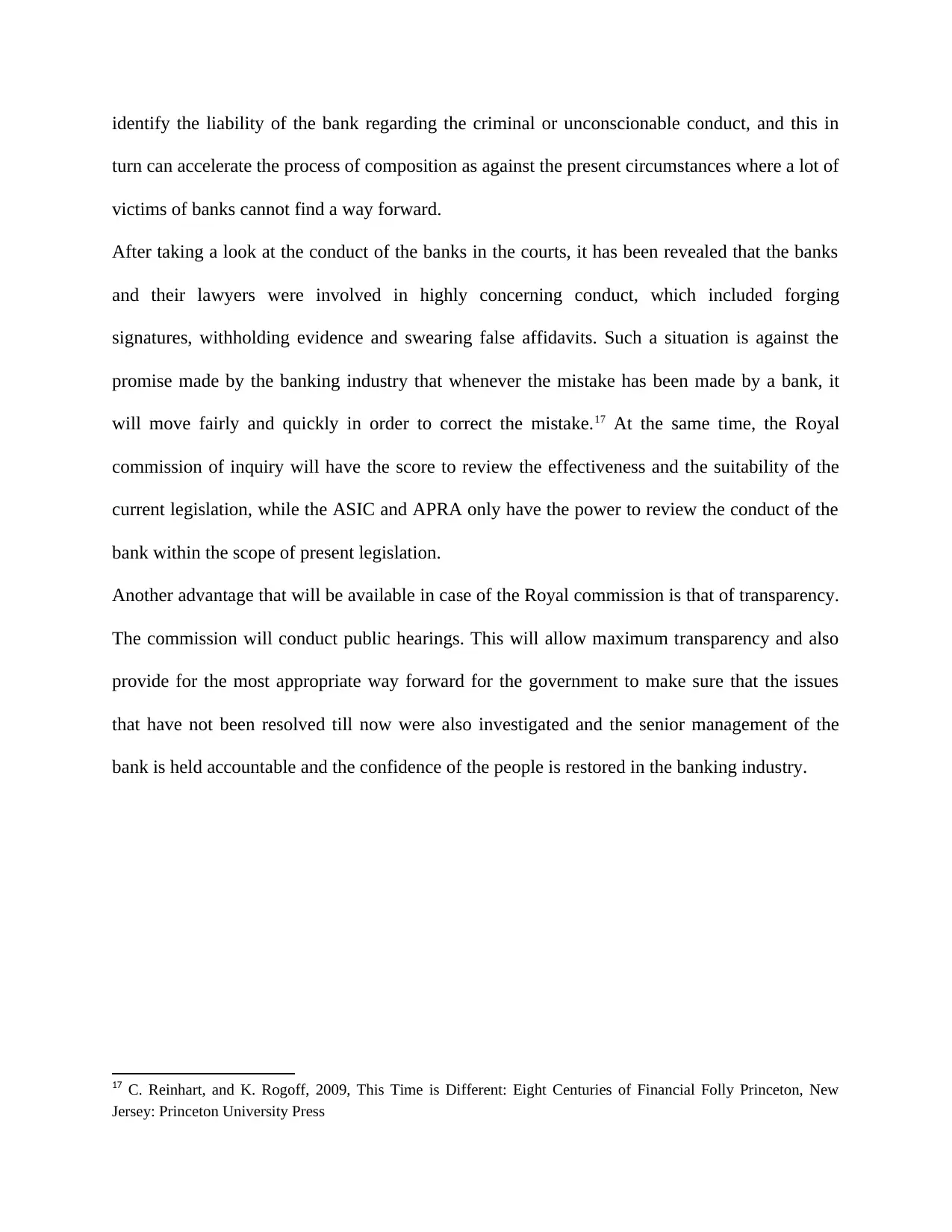
identify the liability of the bank regarding the criminal or unconscionable conduct, and this in
turn can accelerate the process of composition as against the present circumstances where a lot of
victims of banks cannot find a way forward.
After taking a look at the conduct of the banks in the courts, it has been revealed that the banks
and their lawyers were involved in highly concerning conduct, which included forging
signatures, withholding evidence and swearing false affidavits. Such a situation is against the
promise made by the banking industry that whenever the mistake has been made by a bank, it
will move fairly and quickly in order to correct the mistake.17 At the same time, the Royal
commission of inquiry will have the score to review the effectiveness and the suitability of the
current legislation, while the ASIC and APRA only have the power to review the conduct of the
bank within the scope of present legislation.
Another advantage that will be available in case of the Royal commission is that of transparency.
The commission will conduct public hearings. This will allow maximum transparency and also
provide for the most appropriate way forward for the government to make sure that the issues
that have not been resolved till now were also investigated and the senior management of the
bank is held accountable and the confidence of the people is restored in the banking industry.
17 C. Reinhart, and K. Rogoff, 2009, This Time is Different: Eight Centuries of Financial Folly Princeton, New
Jersey: Princeton University Press
turn can accelerate the process of composition as against the present circumstances where a lot of
victims of banks cannot find a way forward.
After taking a look at the conduct of the banks in the courts, it has been revealed that the banks
and their lawyers were involved in highly concerning conduct, which included forging
signatures, withholding evidence and swearing false affidavits. Such a situation is against the
promise made by the banking industry that whenever the mistake has been made by a bank, it
will move fairly and quickly in order to correct the mistake.17 At the same time, the Royal
commission of inquiry will have the score to review the effectiveness and the suitability of the
current legislation, while the ASIC and APRA only have the power to review the conduct of the
bank within the scope of present legislation.
Another advantage that will be available in case of the Royal commission is that of transparency.
The commission will conduct public hearings. This will allow maximum transparency and also
provide for the most appropriate way forward for the government to make sure that the issues
that have not been resolved till now were also investigated and the senior management of the
bank is held accountable and the confidence of the people is restored in the banking industry.
17 C. Reinhart, and K. Rogoff, 2009, This Time is Different: Eight Centuries of Financial Folly Princeton, New
Jersey: Princeton University Press
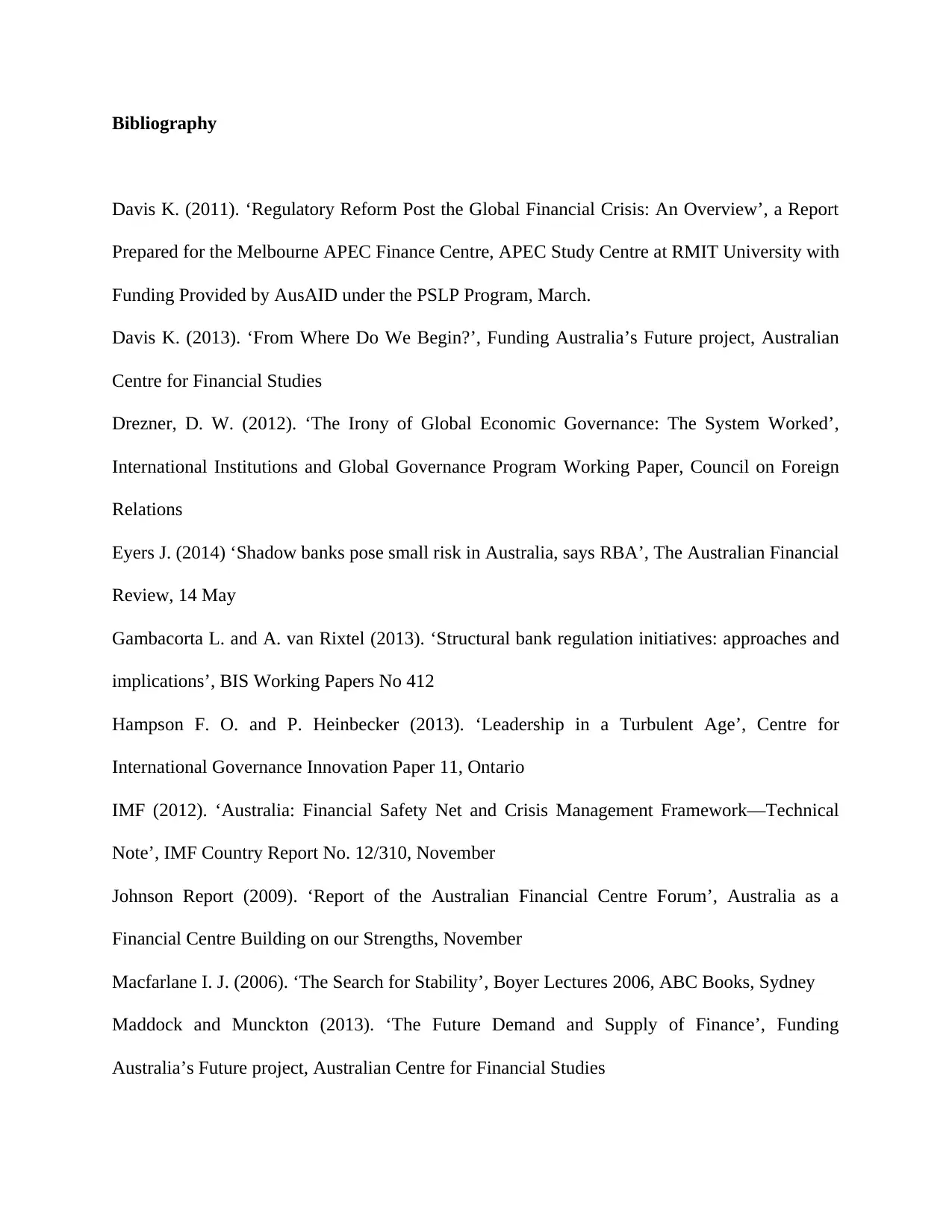
Bibliography
Davis K. (2011). ‘Regulatory Reform Post the Global Financial Crisis: An Overview’, a Report
Prepared for the Melbourne APEC Finance Centre, APEC Study Centre at RMIT University with
Funding Provided by AusAID under the PSLP Program, March.
Davis K. (2013). ‘From Where Do We Begin?’, Funding Australia’s Future project, Australian
Centre for Financial Studies
Drezner, D. W. (2012). ‘The Irony of Global Economic Governance: The System Worked’,
International Institutions and Global Governance Program Working Paper, Council on Foreign
Relations
Eyers J. (2014) ‘Shadow banks pose small risk in Australia, says RBA’, The Australian Financial
Review, 14 May
Gambacorta L. and A. van Rixtel (2013). ‘Structural bank regulation initiatives: approaches and
implications’, BIS Working Papers No 412
Hampson F. O. and P. Heinbecker (2013). ‘Leadership in a Turbulent Age’, Centre for
International Governance Innovation Paper 11, Ontario
IMF (2012). ‘Australia: Financial Safety Net and Crisis Management Framework—Technical
Note’, IMF Country Report No. 12/310, November
Johnson Report (2009). ‘Report of the Australian Financial Centre Forum’, Australia as a
Financial Centre Building on our Strengths, November
Macfarlane I. J. (2006). ‘The Search for Stability’, Boyer Lectures 2006, ABC Books, Sydney
Maddock and Munckton (2013). ‘The Future Demand and Supply of Finance’, Funding
Australia’s Future project, Australian Centre for Financial Studies
Davis K. (2011). ‘Regulatory Reform Post the Global Financial Crisis: An Overview’, a Report
Prepared for the Melbourne APEC Finance Centre, APEC Study Centre at RMIT University with
Funding Provided by AusAID under the PSLP Program, March.
Davis K. (2013). ‘From Where Do We Begin?’, Funding Australia’s Future project, Australian
Centre for Financial Studies
Drezner, D. W. (2012). ‘The Irony of Global Economic Governance: The System Worked’,
International Institutions and Global Governance Program Working Paper, Council on Foreign
Relations
Eyers J. (2014) ‘Shadow banks pose small risk in Australia, says RBA’, The Australian Financial
Review, 14 May
Gambacorta L. and A. van Rixtel (2013). ‘Structural bank regulation initiatives: approaches and
implications’, BIS Working Papers No 412
Hampson F. O. and P. Heinbecker (2013). ‘Leadership in a Turbulent Age’, Centre for
International Governance Innovation Paper 11, Ontario
IMF (2012). ‘Australia: Financial Safety Net and Crisis Management Framework—Technical
Note’, IMF Country Report No. 12/310, November
Johnson Report (2009). ‘Report of the Australian Financial Centre Forum’, Australia as a
Financial Centre Building on our Strengths, November
Macfarlane I. J. (2006). ‘The Search for Stability’, Boyer Lectures 2006, ABC Books, Sydney
Maddock and Munckton (2013). ‘The Future Demand and Supply of Finance’, Funding
Australia’s Future project, Australian Centre for Financial Studies
⊘ This is a preview!⊘
Do you want full access?
Subscribe today to unlock all pages.

Trusted by 1+ million students worldwide
1 out of 13
Related Documents
Your All-in-One AI-Powered Toolkit for Academic Success.
+13062052269
info@desklib.com
Available 24*7 on WhatsApp / Email
![[object Object]](/_next/static/media/star-bottom.7253800d.svg)
Unlock your academic potential
Copyright © 2020–2026 A2Z Services. All Rights Reserved. Developed and managed by ZUCOL.





